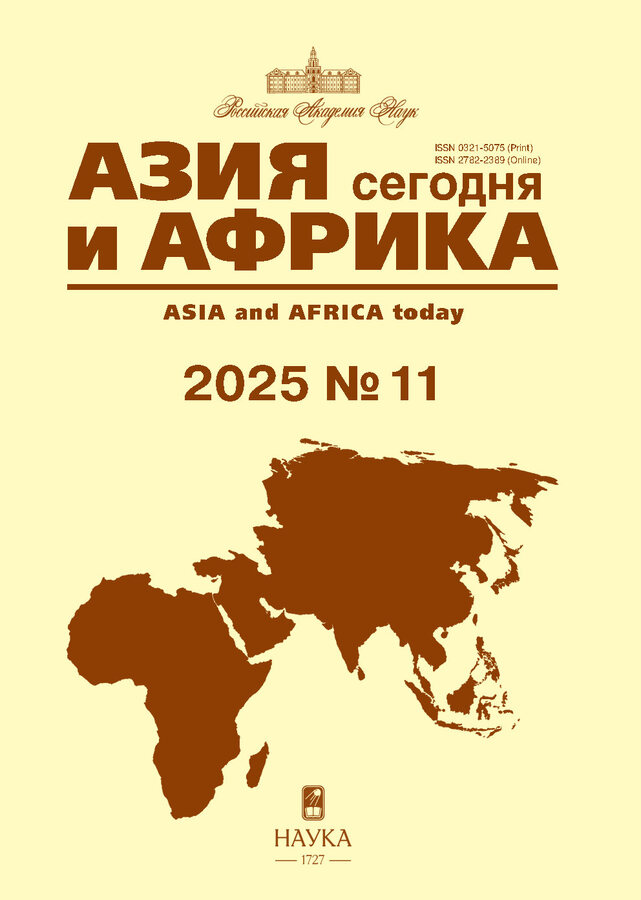Дефицит воды как фактор конфликтогенности и трансформаций в региональной политике Республики Судан
- Авторы: Денисова Т.С1, Костелянец С.В1
-
Учреждения:
- Институт Африки РАН
- Выпуск: № 11 (2025)
- Страницы: 24-34
- Раздел: Политика, экономика
- URL: https://journals.eco-vector.com/0321-5075/article/view/696464
- DOI: https://doi.org/10.31857/S0321507525110032
- ID: 696464
Цитировать
Полный текст
Аннотация
Дефицит пресной воды, усугубляемый глобальными климатическими изменениями, представляет собой серьезную проблему для многих африканских стран. В условиях социально-экономической и политической нестабильности водный кризис усиливает конфликтогенный потенциал, влияя на направления экономического развития и в ряде случаев на формирование внешней политики. Это особенно актуально для стран бассейнов крупных трансграничных рек, где доступ к воде критически важен для населения. В статье рассматриваются характер водных ресурсов и их роль в политическом и экономическом развитии Республики Судан в постколониальный период, т.е. с 1956 г., переживающей затяжные конфликты, подогреваемые в т.ч. соперничеством за ресурсы. Анализируются метаморфозы в отношении суданских властей к механизмам распределения вод крупнейшей африканской реки – Нила – между странами, расположенными в ее бассейне, и к строительству Великой эфиопской плотины Возрождения (ВЭПВ) – еще не завершенного проекта, реализация которого способна изменить геополитическую ситуацию в Северо-Восточной Африке.
Об авторах
Т. С Денисова
Институт Африки РАН
Email: tschen@hotmail.com
ORCID iD: 0000-0001-6321-3503
кандидат исторических наук, ведущий научный сотрудник, зав. Центром изучения стран Африки южнее Сахары Москва, Россия
С. В Костелянец
Институт Африки РАН
Email: sergey.kostelyanyets@gmail.com
ORCID iD: 0000-0002-9983-9994
кандидат политических наук, ведущий научный сотрудник, зав. Центром социологических и политологических исследований Москва, Россия
Список литературы
- Homer-Dixon T. F. 2010. Environment, scarcity, and violence. Princeton: Princeton University Press. doi: 10.1515/9781400836166
- Gleick P.H. 1993. Water and Conflict: Fresh Water Resources and International Security. International Security. Vol. 18. № 1. Pp. 79–112. doi: 10.2307/2539033
- Uitto J.I., Wolf A.T. 2002. Water Wars? Geographical Perspectives: Introduction. Geographical Journal. Vol. 168. № 4. Pp. 289–292. doi: 10.1111/j.0016-7398.2002.00056.x
- Wolf A.T. 1998. Conflict and Cooperation Along International Waterways. Water Policy. Vol. 1. № 2. Pp. 251–265. doi: 10.1016/S1366-7017(98)00019-1
- Zeitoun M., Warner J. 2006. Hydro-Hegemony – a Framework for Analysis of Trans-Boundary Water Conflicts. Water Policy. Vol. 8. № 5. Pp. 435–460. doi: 10.2166/wp.2006.054
- Wheatley M.C. 2024. Water Scarcity and Social Conflict: A Review. Premier Journal of Environmental Science. Vol. 1. № 100006. doi: 10.70389/PJES.100006
- Alzubair M.A.H.A. 2020. Geographical and Hydrological Effects of Nubian Sandstone Formations on Ground Water in Khartoum State – Sudan. International Journal of Hydrology. Vol. 4. № 6. Pp. 270–279.
- Abdelmawla M. 2017. Water Poverty and its Impact on Income Poverty and Health Status in Sudan: The Case of Gezira State (1993–2013). International Journal of African Development. Vol. 4. № 2. Pp. 99–109.
- Omer A.M. 2013. Sustainable Water Resources Management, Future Demands and Adaptation Strategies in Sudan. Global Journal of Human Social Science. Vol. 13. № 3. Pp. 12–29.
- Гришина И.Б. Экологические аспекты состояния африканских прибрежных территорий. Ученые записки Института Африки РАН. 2022. № 3. С. 110–118. doi: 10.31132/2412-5717-2022-60-3-110-118
- Adam A.B., Elamin A.W.M., Hamid A.M.N. 2017. Effect of Management Practices on Water Use Efficiency of Gezira Irrigated Scheme – Sudan. International Research Journal of Agricultural Science and Soil Science. Vol. 7. № 3. Pp. 40–45. doi: 10.14303/irjas.2017.058
- Moorehead A. 1960. The White Nile. Harmondsworth: Penguin Books.
- EI Zain M. 2008. People's Encroachment onto Sudan's Nile Banks and its impact on Egypt. In: Pachova N.I., Nakayama M., Jansky L. (eds.). International Water Security: Domestic Threats and Opportunities. Tokyo, N.Y., Paris: United Nations University Press. Pp. 129–160.
- Костелянец С.В. Дарфур: история конфликта. М.: Институт Африки РАН, 2014.
- Rutten M., Dietz T., Seuren G., Veldkamp F. 2014. Water Dynamics in the Seven African Countries of Dutch Policy Focus: Benin, Ghana, Kenya, Mali, Mozambique, Rwanda, South Sudan. Leiden: African Studies Centre. https://aquaforall.org/viawater/files/asc_water_south_sudan_3.pdf (accessed 29.03.2025)
- Lamberts E. 2009. The Effects of Jonglei Canal Operation Scenarios on the Sudd Swamps in Southern Sudan. Master's thesis. Enschede: University of Twente. https://essay.utwente.nl/59163/1/scriptie_E_Lamberts.pdf (accessed 29.03.2025)
- Salman S.M.A. 2010. Water Resources in the Sudan North-South Peace Process: Past Experience and Future Trends. African Yearbook of International Law Online. Vol. 16. № 1. Pp. 299–328. doi: 10.1163/22116176-90000056
- Salman S.M.A. 2011. The New State of South Sudan and the Hydro-Politics of the Nile Basin. Water International. Vol. 36. № 2. Pp. 154–166. doi: 10.1080/02508060.2011.557997
- De Falco S., Fiorentino G. 2022. The GERD Dam in the Water Dispute Between Ethiopia, Sudan and Egypt. A Scenario Analysis in an Ecosystem Approach Between Physical and Geopolitical Geography. AIMS Geosciences. Vol. 8. № 2. Pp. 233–253.
- Khalifa M., Woods N.E., Eltahir E.A.B. 2023. Estimates of Sudan's historical water withdrawals from the Nile. Journal of Hydrology. Vol. 624. № 129858. Pp. 1–14. doi: 10.1016/j.jhydrol.2023.129858
- Волков С.Н. Проблема нехватки пресной воды в Египте и возможности её решения. Азия и Африка сегодня. 2024. № 9. С. 21–29. С. 26. doi: 10.31857/S0321507524090034
- 2022. Water Politics. How Sudan's Turbulent Transition toward Democracy Has Led It to Compromise Its Own Well-Being over the Grand Ethiopian Renaissance Dam. IAI Papers. Vol. 22. № 30. Pp. 1–17. https://hidropolitikakademi.org/uploads/editor/images/Water_Politics_How_Sudans_Turbulent_Tran.pdf (accessed 29.03.2025)
- Мезенцев С.В., Копыцев И.С. Конфликт в Тиграе два года спустя: политические последствия для Эфиопии. Азия и Африка сегодня. 2025. № 5. С. 45–53. doi: 10.31857/S0321507525050055
- Donelli F. 2022. The Al-Fashaga Dispute: A Powder Keg in the Heart of the Horn of Africa. Trends Research and Advisory. Vol. 4. https://trendsresearch.org/insight/the-al-fashaga-dispute-a-powder-keg-in-the-heart-of-the-horn-of-africa (accessed 29.03.2025)
Дополнительные файлы











